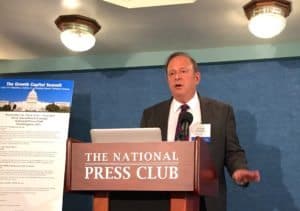Often repeated, but not always followed, is the advice: follow the money. Sometimes basic problems – and their solutions – are more readily understood (and solved) with this simple mantra.
Effective capital markets are no exception. They demand faithful adherence to this principle. Lose sight of this, and you will lose your way in the forest.
I was reminded of this lesson recently by a gentlemen who has earned the well deserved title “Father of the JOBS Act,” David Weild, whose credits include former Vice Chair of Nasdaq. For those active in the capital markets and regulatory reform, his name is a household word.
 Way back in 2011, on the eve of the genesis of the Congressional legislation that became known as the Jumpstart Our Business Startups Act of 2012 (the JOBS Act), Mr. Weild penned an article in the Wall Street Journal on a subject that has captured widespread attention in recent years: the need for capital markets with rules tailored to facilitate trading in small cap securities – often referred to as venture markets. The title: “How to Revive Small Cap IPOs.”
Way back in 2011, on the eve of the genesis of the Congressional legislation that became known as the Jumpstart Our Business Startups Act of 2012 (the JOBS Act), Mr. Weild penned an article in the Wall Street Journal on a subject that has captured widespread attention in recent years: the need for capital markets with rules tailored to facilitate trading in small cap securities – often referred to as venture markets. The title: “How to Revive Small Cap IPOs.”
The premise was simple. Absent federal legislation and SEC rulemaking which was “friendly” to the trading of small cap stocks in the secondary market, initial public offerings for these securities would be artificially limited. Friendly, of course, meant at the least, providing a market environment which would incentivize those in the business of buying and selling securities – licensed broker-dealers. Money naturally seeks “higher ground” – meaning higher returns. According to Weild:
“What’s needed now is a new, parallel market for public companies under $2 billion in value. Trading rules in this new market would allow for higher commissions, which would provide adequate incentives for small investment firms to get back into the business of underwriting and supporting small-cap companies. The SEC could use its authority under securities laws to exempt this market from rules standing in the way, or Congress can step in.” [Emphasis added]
The concept of venture exchanges was nowhere to be found in the 2012 JOBS Act – more than six years later we are still awaiting updated legislation and SEC rulemaking to implement Weild’s vision of vibrant small cap markets. But recognizing the need to adequately compensate licensed broker-dealers remains a lynchpin of unlocking the full potential of two JOBS Act reforms: Crowdfunding (Title III of the JOBS Act)) and Title IV (aka Regulation A+).
Regulation A+
I recently wrote an article in Crowdfund Insider discussing the subject of increasing the offering limit of Regulation A+ from the current limit of $50 million. Moving up the limit to $100 million would likely attract greater attention from the broker-dealer community – and higher quality offerings. Thus far, the SEC has turned a blind eye and a deaf ear to increasing this limit, though the JOBS Act directs the SEC to periodically review and adjust this limit.
Less spoken to publicly are the current FINRA / SEC rules governing compensation in Regulation A+ offerings.
 Though these offerings are akin to IPOs, permissible compensation to broker-dealers under FINRA rules is far less attractive than FINRA-allowable compensation for fully registered IPOs. The problem is exacerbated by the inability of broker-dealers to utilize what is known as the “Green Shoe,” a commonly negotiated right in traditional IPOS – allowing the underwriter to purchase up to 15% of the offering amount, at the offering price – for a period of up to 45 days from the offering date.
Though these offerings are akin to IPOs, permissible compensation to broker-dealers under FINRA rules is far less attractive than FINRA-allowable compensation for fully registered IPOs. The problem is exacerbated by the inability of broker-dealers to utilize what is known as the “Green Shoe,” a commonly negotiated right in traditional IPOS – allowing the underwriter to purchase up to 15% of the offering amount, at the offering price – for a period of up to 45 days from the offering date.
Recently, at a Deal Flow Media Regulation A+ conference in Manhattan, Mark Elenowitz, CEO of TriPoint Global Equities, the most active broker in the Reg A+ space, confirmed that he has had discussions with the SEC to allow the use of the Green Shoe in best efforts Reg A offerings, so far without success.
And the inability of broker-dealers to utilize the Green Shoe in Regulation A+ offerings may explain the relatively poor aftermarket performance of the few Regulation A+ broker-assisted offerings to date. With a Green Shoe in place, brokers are incentivized to price the offering on the low end of the offering range – hoping to profit from an active (hot) aftermarket above the offering price. With the Green Shoe off the table, brokers are incentivized to price the offering on the high end of the range –increasing their aggregate dollar compensation as a percentage of the offering’s proceeds.
My take: unless and until Regulation A+ offering limits are increased, and broker-dealer compensation rules tailored to address the market risk of participants – both offering quality and deal flow will continue to suffer.
Regulation CF Crowdfunding – How Much Does Size Really Matter?
 While permissible offering size matters, this is only part of the equation in facilitating active capital markets. It seems that this message was completely lost on the 10 highly visible and distinguished signatories to a recently publicized letter to the Chairman of the SEC, requesting that the current $1,070,000 Regulation CF offering limit be increased to a lofty $20 million.
While permissible offering size matters, this is only part of the equation in facilitating active capital markets. It seems that this message was completely lost on the 10 highly visible and distinguished signatories to a recently publicized letter to the Chairman of the SEC, requesting that the current $1,070,000 Regulation CF offering limit be increased to a lofty $20 million.
While larger deals could in theory benefit this market, there are equally compelling roadblocks to an expanded use of this exemption from SEC registration – which could easily be remedied by the SEC – and must accompany any increase in the Regulation CF offering limit if this is to be a meaningful exercise of SEC rulemaking power.
Courtesy not of the JOBS Act legislation, but in my opinion, short sighted and overly cautious SEC regulations, the SEC’s broker-dealer and funding portal compensation rules restrict the ability of market participants to receive equity-based compensation. So called “warrant coverage,” a staple of most brokered private placements, are taboo under the SEC Regulation CF regulations. So this is one more reason for a broker to avoid a Regulation CF offering, and instead opting for the more lucrative Regulation D private placements.
 Certainly, modifying permissible broker/funding portal compensation is not the only fix necessary to improve Regulation CF, but it is a critical one. Simply raising the offering limits will not, ipso facto, attract capital. The history of Regulation A+ is one recent example– where offerings of up to $50 million are allowed – but few if any companies have even come close to this mark. Nor is the issue of permissible crowdfunding compensation a new one for the SEC – it was raised repeatedly in SEC comment letters during proposed rulemaking, and was labeled by me in an article in Crowdfund Insider as one of the “six deadly sins” of Regulation CF rulemaking back in 2014 – something I referred to then as a “potential ‘industry killer’” for the fledgling investment crowdfunding market. (So too, burdensome SEC rules requiring overly detailed annual ongoing reporting). And a self-inflicted wound by the SEC at that – limitations on broker/funding portal compensation was nowhere to be found in the original JOBS Act legislation.
Certainly, modifying permissible broker/funding portal compensation is not the only fix necessary to improve Regulation CF, but it is a critical one. Simply raising the offering limits will not, ipso facto, attract capital. The history of Regulation A+ is one recent example– where offerings of up to $50 million are allowed – but few if any companies have even come close to this mark. Nor is the issue of permissible crowdfunding compensation a new one for the SEC – it was raised repeatedly in SEC comment letters during proposed rulemaking, and was labeled by me in an article in Crowdfund Insider as one of the “six deadly sins” of Regulation CF rulemaking back in 2014 – something I referred to then as a “potential ‘industry killer’” for the fledgling investment crowdfunding market. (So too, burdensome SEC rules requiring overly detailed annual ongoing reporting). And a self-inflicted wound by the SEC at that – limitations on broker/funding portal compensation was nowhere to be found in the original JOBS Act legislation.
And even enhanced broker / funding portal compensation may not adequately incentivize brokers to steer retail non-accredited investors to the most risky of investments – who are saddled under FINRA rules with KYC (know your customer) responsibilities and the attendant liability to investors if the investment goes south.
So with all due respect to the signatories to the July 19 letter to Chairman Clayton, by taking a shotgun approach to Regulation CF fixes – simply focusing on increasing the permissible limits of a Regulation CF offering – rather than putting their best foot forward they may have shot themselves and the industry in the foot –- giving some credence to the somewhat Freudian typo in the first sentence of their July 19 letter:
“ We compromise the largest online crowdfunding platforms and industry influencers in the United States.” [Emphasis added].
I rest my case. Time for the SEC and FINRA to pick up the slack.
 Samuel S. Guzik, a Senior Contributor to Crowdfund Insider, is a corporate and securities attorney and business advisor with the law firm of Guzik & Associates, with more than 30 years of experience in private practice. Guzik is also former President and Board Chair of the Crowdfunding Professional Association (CfPA) and CfPA Legislative & Regulatory Special Counsel. A nationally recognized authority on the JOBS Act, including Regulation D private placements, investment crowdfunding and Regulation A+, he is and an advisor to legislators, researchers and private businesses, including crowdfunding issuers, service providers and platforms, on matters relating to the JOBS Act. As an advocate for small and medium sized business, he has engaged with major stakeholders in the ongoing post-JOBS Act reform, including legislators, industry advocates and federal and state securities regulators. His articles on JOBS Act issues, including two published in the Harvard Law School Forum on Corporate Governance and Financial Regulation, have also served as a basis for post-JOBS Act proposed legislation.
Samuel S. Guzik, a Senior Contributor to Crowdfund Insider, is a corporate and securities attorney and business advisor with the law firm of Guzik & Associates, with more than 30 years of experience in private practice. Guzik is also former President and Board Chair of the Crowdfunding Professional Association (CfPA) and CfPA Legislative & Regulatory Special Counsel. A nationally recognized authority on the JOBS Act, including Regulation D private placements, investment crowdfunding and Regulation A+, he is and an advisor to legislators, researchers and private businesses, including crowdfunding issuers, service providers and platforms, on matters relating to the JOBS Act. As an advocate for small and medium sized business, he has engaged with major stakeholders in the ongoing post-JOBS Act reform, including legislators, industry advocates and federal and state securities regulators. His articles on JOBS Act issues, including two published in the Harvard Law School Forum on Corporate Governance and Financial Regulation, have also served as a basis for post-JOBS Act proposed legislation.


